Azuh Arinze – The resilient reporter with a knack for exclusives and hard-to-find scoops
Neusroom’s Michael Orodare writes about Azuh Arinze, the resilient reporter, editor and publisher with a formidable network of Nigeria’s who’s who.
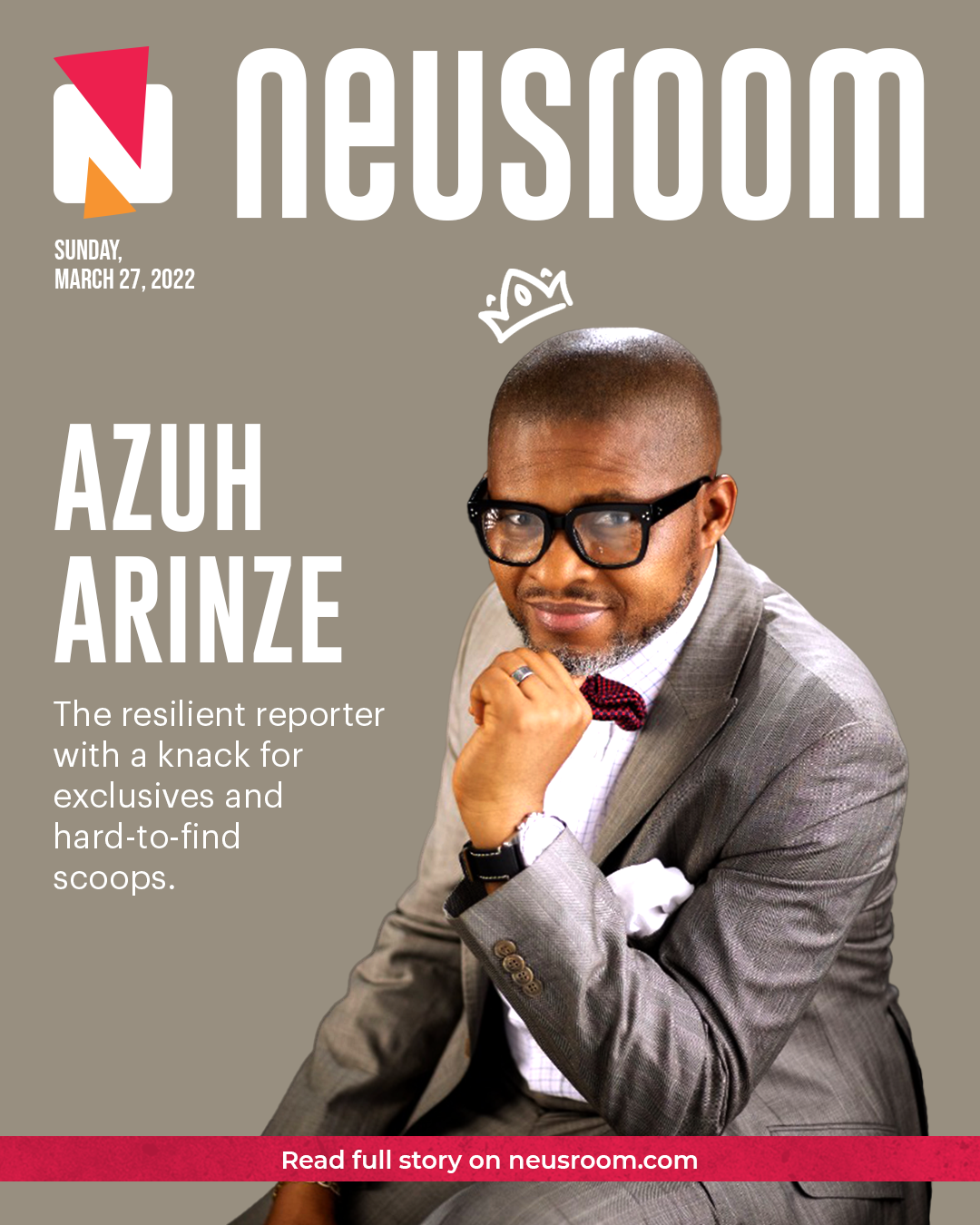
Written by Michael Orodare for Neusroom
27th March 2022
Not many Nigerian journalists can rival the significant contribution of Arinzechukwu Joachim Azuawusiefe – ‘Azuh Arinze’ to journalism from the late 1990s, as a reporter, editor and publisher.
In the late 1990s and early 2000s, before social media became the big thing, City People, Encomium, Ovation, FAME, Hints and Hearts Magazines gave us a sneak peek into the lives of celebrities and people in the news. Azuh, one of the most resilient reporters of his generation, made it possible through exclusive high profile interviews.
In 25 years, Azuh, now publisher of Yes International Magazine, has built a formidable network of who’s who in Nigerian politics, media, sport, business, entertainment and the religious circle. To his credits are about 500 exclusive interviews with high profile Nigerians across all fields at the peak of their careers.
He has an uncanny ability to pull off an interview from any high profile personality anywhere he meets them. Late Prof. Dora Akunyili stopped her convoy to speak with him when she was the Director-General of NAFDAC. Dr. Christopher Kolade broke his protocol to talk to Azuh when they met at an event. Bianca Ojukwu became his friend after one encounter. Azuh is that resilient reporter who never lets a VIP go without scooping an exclusive from them.
“How do you write about a man who has interviewed most of Nigeria’s who’s who in the last two decades?”
I asked myself during my research on Azuh before setting out for his office in the Ojodu area of Lagos on Friday, March 18, 2022, with my colleague Oluwaloseyifunmitan Adeyemi. I had thought there won’t be so much to ask him, just a few questions about the previously-unknown stories of his life, and we should be done in a few minutes. I was wrong.
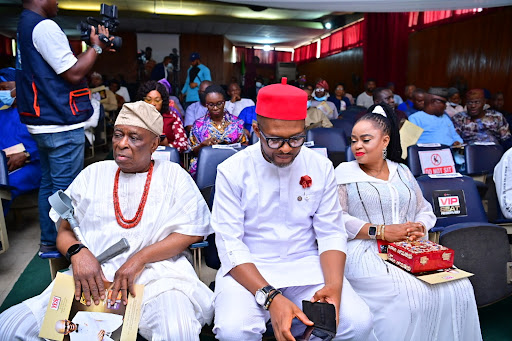
Azuh Arinze (middle) with Segun Osoba, an award-winning veteran journalist and former Governor of Ogun State, who was profiled in one of Arinze’s recently published books. Photo: BHM.
Azuh and I spoke for more than one hour, and after the interview, the conversation about life and career continued.
“I enjoyed the interview,” he told me after the session. “That’s what I was saying about being a good journalist and interviewer, things I wouldn’t have said; I was comfortable to share them with you.”
From Notoriety to Chief Cornerstone
Born in Azia on March 24, 1972, into a Catholic family where missing church activities attracted corporal punishment, Azuh spent his early days in Azia and Nsukka. Azia, a relatively small town and predominant Christian community in Ihiala LGA, Anambra state, is about 80km from Onitsha, the economic hub of southeast Nigeria.
His name Arinzechukwu encapsulates his mother’s experience in the early days of her marriage.
Azuh told me his father was the only child of his parents, and when he got married to his mom, they had a delay with childbirth. “It was difficult for her to conceive, and the family was already planning to get my father another wife. Fortunately for my mom, she took in, so when she had me, she named me Arinzechukwu, which means ‘if not for God’,” Azuh told me.
He described his mother as an industrious woman. And his late father? A master planner. He learnt one of the most important management principles – planning, from his father, a teacher who worked in the fire service and later moved to Lagos to start a business.
Before his family moved to Lagos, where he schooled at Victoria Island Secondary School and was one of the most outstanding English students, Azuh had spent time at Township Primary School and St Theresa School, Nsukka.
It was at Nsukka, Azuh was known for notoriety.
“I did too many bad things as a young boy growing up. I was very rascally. A lot of people thought I would not amount to anything. It got to a point; some parents never wanted their kids around me,” Azuh says. “I could just walk into a compound and feel like breaking the windscreen of any vehicle. Before doing it, I’d have thought about the consequences. My mom and dad would give me 12 strokes each, let me just do it and wait for them to beat me and pay for the damage.”
Recalling a significant event that transformed his life, he said: “A dog in the neighbourhood gave birth, then one of the puppies strayed from it. I picked it up and took it home. When my mother got home, the first thing she asked was where did I see the puppy. I was a champion liar. I said I visited one of my friends, their dog gave birth, and they gave me one. I asked her for money to buy milk for the dog; she gladly gave me, and I named the dog billy.
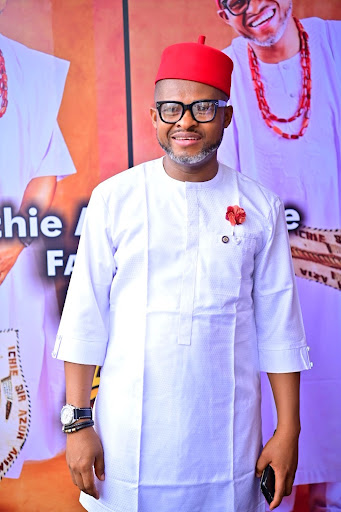
Before becoming one of the best English Language students at Victoria Island Secondary School in Lagos, Azuh said he was very rascally.
“When the owners started looking for the puppy, people in the neighbourhood told them they saw it with Arinze. My mother felt embarrassed when the owners came. She calls me ‘Nna (my darling), but this wasn’t what you told me’. So my mom pacified the people and gave them the puppy. I expected the usual punishment when they left, but she did something amazing. She held my head on her chest and started crying, saying, ‘why are you causing me so much pain and bringing me shame? You know I could buy you 20 puppies if you had told me you wanted one’. I felt sober and promised her I would never cause her pain again, which was the turning point.”
Azuh told me that was the incident that changed his life from the rascal boy no parent wanted their children to associate with to the role model many parents chose to name their sons after.
“After the transformation, there’s no compound in our neighbourhood without someone named Arinze. Even in my village now, nearly everybody has one Arinze or two in their compound, and my mom said it got her wondering. One day, she asked why everybody named their children Arinze; they said they wanted them to be like me,” Azuh says.
When his family, comprising of seven children and their parents, moved to Lagos, they lived in a room and parlour in what is known as a face-me-I-face-you apartment on Oroke street in Maroko.
Before the July 1990 brutal eviction of Maroko residents by the military government of Raji Rasaki, the slum community was home to many low-income new migrants to Lagos. After a radio announcement giving the residents eight days to vacate Maroko, soldiers moved in with bulldozers to purge the community on the seventh day. Maroko later became Lekki phase 1 and Oniru Royal Estate, one of Nigeria’s affluent neighbourhoods home to many middle-class citizens and entertainers.
Azuh described the purging as the usual ‘rich oppressing the poor’.
The Journalism Journey
When his family left Maroko, part of the family’s responsibilities fell on the shoulders of 18-year-old Azuh, and that was around the time his journalism journey started, but he didn’t set out to be a journalist.
As he told me, his dream was to be a lawyer, but ‘journalism chose me’. His law dream was dashed after failing the English language in SSCE.
“I was adjudged good in English, so I was like the one representing the school in the debating society competition, coming tops and taking the first position. So apparently, it got into my head, and then I wrote WAEC and failed English. The school and my parents couldn’t believe it. It was a big shock and surprise to many,” he says.
His father put him in charge of one of his shops to manage after failing his best subject, but his avid reading habit remained with him.
“One Saturday, out of boredom, I bought a copy of a Saturday Punch, they had an interesting cover, I read and fell in love with it. The person handling the column was Mr Azuka.”
When Femi Akintunde-Johnson took over the page, Azuh immediately became a fan of FAJ, as he is fondly called.
When FAJ left Punch to start FAME Magazine in 1991 with his friends Kunle Bakare and Mayor Akinpelu, the magazine created a writing competition that celebrated winners as ‘reader of the month’ with a cash prize. Azuh was the first winner of the competition.
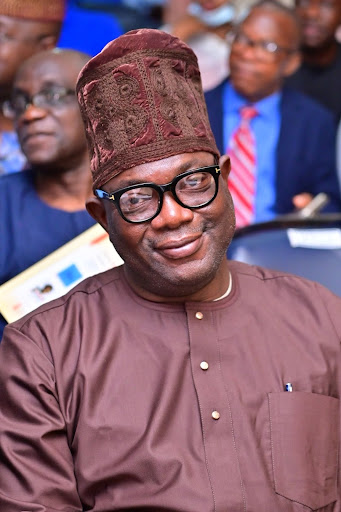
Kunle Bakare, Publisher of Encomium Magazine, influenced Azuh Arinze’s fashion.
“The cash prize was N10,000, it was a lot of money at that time, and it came after the Maroko eviction. I used part of the money to go to school and moved my family,”
Azuh says. His encounter with Kunle Bakare and FAJ attracted him to journalism.
“The day I went to collect the prize, I fell in love with journalism because I saw the young men smartly dressed when I got there. I got stuck and went to school to study mass communication.”
After his two years OND programme, Azuh went back to FAME Magazine for his one-year internship, “FAJ just told me to sit down and write, and that was how the journey started. The first five stories I wrote as an intern made it to the magazine’s cover, and that was how they gave me automatic employment. But much later, I almost didn’t want to continue with my education, but some people intervened and said I should go back to school, so I combined work with my studies.”
After his HND programme at the Institute of Management Technology (IMT), Enugu, 26-year-old Azuh was appointed Editor of a new publication, ‘Reel Stars’ magazine, a sister publication of Encomium. When the magazine was rested after a year, Azuh returned to Encomium and served as the Editor for eight years, the longest-serving Editor of the magazine before deciding it was time to go in 2011.
“After working for 14 years, there was nothing more to prove, so I had to move on,” he told me.
When he left Encomium in 2011 to start Yes International Magazine, Azuh told me his vision for the lifestyle magazine was “to be the first choice of readers and advertisers and rank among the top in the sector.
He believes Yes Magazine has achieved most of its set goals.
“Yes, started with a bang,” Azuh says. “The acceptance and reception were massive. The grace of God has been on Yes, and we’ve been doing yes now for 11 years.”
In 11 years, Yes Magazine has established a reputation for exclusive stories, interviews, and fact-based reporting.
The Maroko displacement, which placed higher responsibilities on Azuh at a relatively young age, also shaped his perspective about delayed salaries, prevalent in the Nigerian media industry.
In September 2021, the Nigerian Union of Journalists (NUJ) said some media houses owe their staff five months and one year salary.
“I understand what it means to be expecting income at the end of the month,” Azuh told me. “At that young age, my family depended on my income. Imagine if it didn’t come at the right time or if it never comes. It has a ripple effect, it doesn’t affect just you, some people depend on what you get to support them, so when you don’t support them, it automatically frustrates everything, so those were some things that I factored in.”
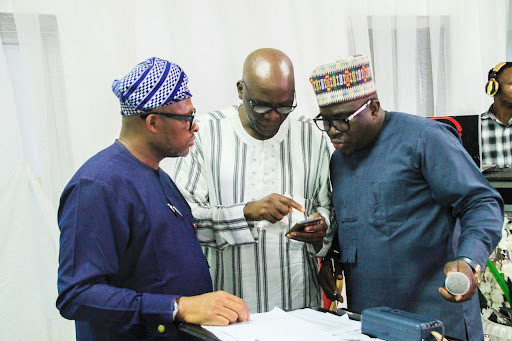
Azuh (left) immediately became a fan of Femi Akintunde-Johnson (middle) when FAJ took over Azuh’s favourite column at Punch Newspaper.
The remarkable qualities that have stood Azuh out in almost three decades of his journalism career are his resilience, persistence and a spirit that never takes no for an answer. This is consistent with some of the best journalists I know.
This attribute has helped him sit with some of the biggest names in Nigeria for an interview. From Prof. Dora Akunyili during her time as the DG of NAFDAC to Dr Christopher Kolade.
Recounting his encounter with Kolade at a public event, he says: “I interviewed many high profile people, from Prof. Pat Utomi to Dr Tunde Lemo and many other top business executives who named Kolade as their mentor. I decided to find him and interview him. So I read in the news that he would be a keynote speaker at an event in Lagos. Uninvited, I got there an hour ahead and waited for his arrival. When he drove in, I walked up to him to welcome him.
He thought I was one of the organisers. I offered to help him carry his bag, he refused, but I walked him into the elevator, where I introduced myself as a journalist and requested an interview. He turned it down and said he was there as a guest speaker. When he saw that I didn’t give up, he agreed to talk to me for just five minutes, but we talked for over 30 minutes.”
Azuh told me from the formative days of his career; he mastered the act of preparedness for any journalistic encounter, ‘you never know who you will run into, so I was always prepared for an interview with my recorder in my pocket. From his sage-like journalism experience, he believes every journalist must always be prepared, knowledgeable about every topic and look good.
“One challenge most journalists have is that they don’t dress well when you carry yourself well, and knowledgeable people will listen to you,” he told me.
Azuh, a power dresser himself, has a charming appearance that opens doors for him at some of the most difficult places. He credits Kunle Bakare, whom he described as one of Nigeria’s best-dressed men, for his influence on his fashion.
“KB taught me the importance of dressing well, and I have seen the benefits over time.”
It was his appearance that attracted him to his wife, Edith, on their first encounter at the NiteShift Coliseum.
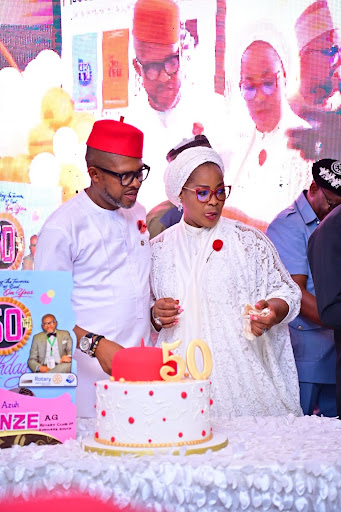
“I asked her: ‘will you be my angel’ and she said ‘okay if you promise to be my archangel’, and that was how it started. Months later, we got married.”
“When the coliseum was in operation, the man had a resource team made up of people like Dr Reuben Abati, Mr Kunle Bakare, Mayor Akinpelu, my wife was also a team member,” he says. “The day I met my wife was when I interviewed Otunba Subomi Balogun, the founder of First City Monument Bank (FCMB).”
In a previous interview, Balogun had said he has the best pinstripped suits in the world, so Azuh decided to wear one to interview him.
“I wore a pinstriped suit and a Navy blue shirt, a yellow tie with a nice pair of shoes. After the interview, I went for the resource team meeting; as I entered the room, Edith told her friend, this is the kind of man I want as a husband.”
A few days later, Azuh says he and Edith drove past each other at Ikeja; he realised her wave wasn’t ordinary, and he followed the sign.
“I didn’t have her phone number, so I got it from another team member. When I called her, I told her I’d like to talk to her, but I don’t talk to women in the afternoon; I talk to them at night when they are relaxed, and we agreed to talk at 10 pm,” Azuh told me.
“At exactly 10 pm, I called her, and I said madam see I’m going to go straight to the point. I remember what I said to her categorically. I said, ‘will you be my angel’ and she said ‘okay if you promised to be my archangel’, and that was how it started. Months later, we got married.”
That was how their love story started and has birthed two teenage girls, Adaeze and Geraldine.
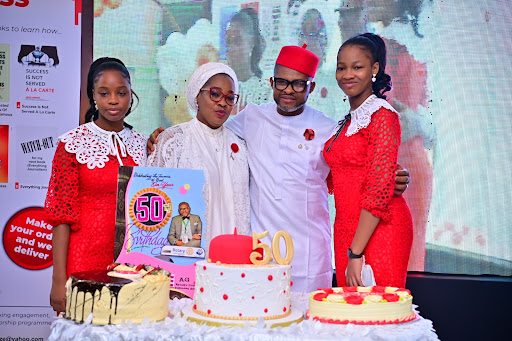
Azuh Arinze celebrates his 50th birthday with his family in Lagos. Photo: BHM.
Everything he has always wanted, journalism has given to him, including holding a chieftaincy title in his hometown as the Odenigbo of Azia.
Azuh is a man of strong faith, and he carries his Christian badge in his chest. He told me he doesn’t joke with his faith. And as a Knight in the Catholic church, he values his Christian life.
“What would I have been without FAJ and KB?” Azuh said. KB and FAJ are part of the reasons Azuh gets furious when Nigerians complain about tribalism.
“I don’t believe in tribalism. The people who have assisted me the most are Yoruba people. I walked into a company where I didn’t know anybody. I only told them I could write, and Mr FAJ said I should sit down and write something, and that was how I started.”
He imagined how his journey would have turned out if the duo had not given him the opportunity that sparked journalism fire in him.
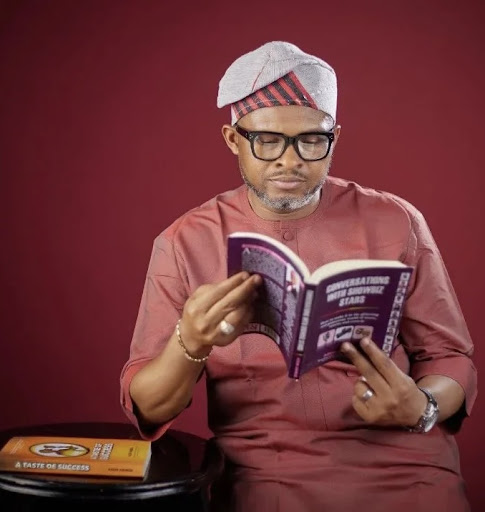
Azuh says he plans to write 50 books and earn a pursue his childhood dream of becoming a lawyer. Photo: Azuh Arinze.
Azuh may have achieved many of his dreams with journalism, but he’s not abandoning his childhood dream of becoming a lawyer, which sits atop his list of life goals as he faces the next phase.
He also told me he wants to write 50 books but has only written seven, including the two launched on his 50th birthday – “A Taste Of Success” and “Conversations With Showbiz Stars”.
Azuh’s story reminded me of how I got into journalism through an internship after walking into the office of an Editor who had never met me before that day but gave me the opportunity. I left the Yes International Magazine office with an affirmed appreciation of the men who constantly open the door for young people’s careers even when they don’t know them in a world where honesty has become a liability.

